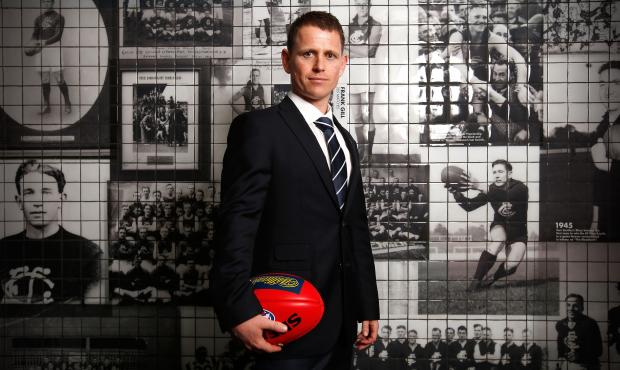NINE days after Alastair Clarkson lifted the premiership cup for the fourth time, the next wave of senior coaches aiming to emulate his feats sit in the AFL boardroom with their pens poised.
"Bullying never works," they're told. "Coercion never works … you want creative players."
They're listening intently to University of Queensland professor Cliff Mallett, a former World Championship and Olympic sprint coach who led the Australian men's 4x400m relay team to a silver medal at the 2004 summer games in Athens.
He is presenting on 'quality coaching' using a study of international leaders in sport, and telling athletes how to think and behave is a mistake commonly made.
What about sending a team to jump off a pier at 5am after a loss, Mallett is asked. "If they understand why they're doing it, it's not controlling."
The boardroom operates under the Chatham House Rule – what's said in the room stays in the room – given these rival coaches are sharing information and case studies about their own experiences at their clubs.
Welcome to the AFL's Level Four Senior Coach program, an already successful course that is aiming to improve the skills of the assistant coaches most likely to take the next step when senior vacancies emerge.
In the room are Stuart Dew (Sydney Swans), Matthew Nicks (Port Adelaide), Blake Caracella (Geelong), Simon Lloyd (Geelong), Adam Kingsley (St Kilda) and Simon Goodwin (Melbourne).
Carlton's new senior coach Brendon Bolton will be the first graduate after meeting the criteria, while Robert Harvey (Collingwood) and John Barker (Carlton) are on leave.
Former Australian cricket coach John Buchanan and legendary hockey coach Ric Charlesworth are at the table to share their experience as mentors, while fellow mentor Neale Daniher watches over proceedings, asking the most pertinent questions.
This group is considered the best of the best in assistant coaching ranks, having been handpicked by a panel that included John Worsfold, Australian soccer coach Ange Postecoglou and AFL CEOs.
Already Bolton has earned a senior position, Barker has held the position in an interim capacity at the Blues and Lloyd has moved from Fremantle to a director of coaching role at the Cats.
New Carlton coach Brendon Bolton will be the course's first graduate. Picture: AFL Media
Goodwin will take over as the Demons' senior coach in 2017, and Kingsley was named the AFL Coaches Association assistant coach of the year for 2015.
Dew, Nicks, Caracella and Harvey are all spoken about as senior coaches in waiting. You can see why ambitious assistants are polishing their resumes to be part of the course in 2016.
This year's intake is being challenged by Mallett on what type of senior coach they might be and how they would reflect on their career when it finishes.
Most coaches, they're told, wish they knew players better at the end of their careers. They spent too much time focusing on making a drill look good and not enough time understanding personalities.
It's one of the big takeaways from Monday's session. You can't lead others, they're told, until you understand yourself.
This week's sessions, the third module of the program, stretch over two days.
Included was a working lunch with Sir Rod Eddington, a Rhodes Scholar and recipient of a knighthood and an Officer of the Order of Australia medal after a successful and varied career in business.
The coaches also met with West Coast chairman Alan Cransberg, Latrobe University's David Lowden, AFL commissioner Paul Bassat and Victoria University's Denis Hemphill and Elisabeth Wilson-Evered.
"We're exposed to people that we wouldn't normally be exposed to," Lloyd told AFL.com.au after this week's sessions.
"They're high-level conversions, and you're not exposed to some of these conversations unless you've got the right people who have got years of experience.
"None of us take for granted what we're being exposed to."
Lloyd said the program, which has been developed and coordinated by the AFL's Michael Poulton, was very much like a university course.
The Chatham House Rule had been critical in allowing the coaches to share experiences and help develop each other over the season.
"Everyone's got good judgement and no one's talking candidly about the clubs they work for," Lloyd said.
"But they talk about their own personal experience and everyone's respected that."
The next meeting of the Level Four coaches will be in November, with coaches to continue work on their individual learning plans with their assigned mentors.
Applications for new inductees will open in December.



